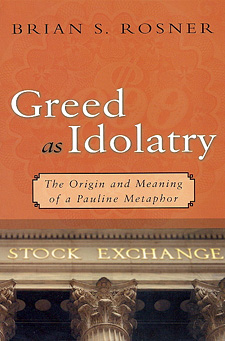Former ALP leader Mark Latham recently wrote that Australians are "disengaging from all things public and devoting themselves to a culture of consumerism and isolationism" (The Financial Review, 9/11/07). We are on an accelerating treadmill of buying and earning, struggling to balance desires for the old Australian dream of home and family with our new means of attaining it through long working hours and massive credit debt.
In his new book, Greed as Idolatry: The Origin and Meaning of a Pauline Metaphor (Eerdmans, 2007), Moore College lecturer Brian Rosner elevates the issue Latham raises to the level of importance the Bible gives it: being greedy is the worst kind of opposition to God. It is idolatry.
 Rosner provides a comprehensive survey of interpretations of Colossians 3:5 and Ephesians 5:5, claiming that the most common view of the meaning of the expression "Greed is idolatry" is that it refers to placing money and wealth in the position of God, as the object of highest devotion. But does this say enough about what is wrong with greed?
Rosner provides a comprehensive survey of interpretations of Colossians 3:5 and Ephesians 5:5, claiming that the most common view of the meaning of the expression "Greed is idolatry" is that it refers to placing money and wealth in the position of God, as the object of highest devotion. But does this say enough about what is wrong with greed?
Rosner suggests that we get closest to Paul's meaning by recognising that "greed is idolatry" is a metaphorical expression"”it puts together two activities (being greedy and worshipping idols) in a new way and generates a morally defensive response in us: "I just want some more money in the bank, what's wrong with that?" We need to grasp the background to this metaphor and feel its weight if we are really to take on board Paul's teaching.
With scholarly persistence, Rosner gives us the background on idolatrous greed from the Old Testament, the Dead Sea Scrolls, inter-testamental literature and Philo. We see many biblical characters struggling with different kinds of greed: Joseph with Potiphar's lustful wife (although Rosner argues carefully that sexual immorality is not the same thing as idolatry in the Bible), Aaron with the Golden Calf (the origins of the link between gold and idolatry?), Job trusting in his great fortune. With increased intensity, Jesus teaches about the threat that desire for wealth poses to one's relationship with God, indicating that a choice between God and Mammon must be made. Idolatry, Rosner claims, is mounting an attack on God's exclusive right to our love and trust.
By examining greed in first-century Christian communities, Rosner concludes that desiring wealth and accumulating it for oneself draws the charge of idolatry. If we "feel the metaphor" "” if we feel shocked by the notion that being greedy for wealth and failing to share it is betraying our God "” then we are starting to learn the lesson of Scripture in this area.
Readers will get most from this book if they have some biblical Greek and are willing to dig deep into the background of a biblical theme; some of the same ideas are explored in a more popular way in Rosner's earlier book, Beyond Greed (Matthias Media, 2005). However, all readers will benefit from preaching and teaching drawn from this careful work.
If disgraced former opposition leaders are putting the nation on notice concerning our idols, how much more should Christians be making the same call, accompanied by the hope of a better object of worship in God and his Christ?























